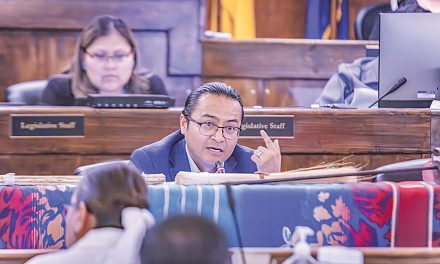
Budget for 2020 COVID-19 donations OK’d, allocated
WINDOW ROCK
If you were wondering what happened to all of the monetary donations that have been coming into the Navajo Nation government through the COVID-19 pandemic, you are not alone.
The $8.9 million raised in 2020 through contributions from individuals, nonprofits and businesses, including via the Nation’s GoFundMe, has finally been allocated and will be spent to support humanitarian aid distribution to chapters and sustain the ongoing Navajo Department of Health COVID-19 response.
Under the final authority of the Budget and Finance Committee last Thursday, the expenditure budget was finally approved in a resolution sponsored by delegates Carl Slater and Vince James, which allocated the 2020 donations based on the Department of Emergency Management’s Fund Management Plan for the “COVID-19 Response Donation Fund.”
The plan was created to ensure that the funds donated to the Nation’s response and relief efforts are spent “promptly” on pandemic preparedness, emergency response, recovery and mitigation of COVID-19 effects.
With the funds, DOH will extend the operation of its Chinle Alternate Care Site and hotel isolation/quarantine sites for positive patients and continue contact tracing, and the Division of Community Development and DEM will distribute essentials including food, water, personal protective equipment, and sanitation supplies in bulk with professional loading, trucking and delivery support.
“In my opinion we are delivering the stated intent of the fund,” said Slater. “I think that a lot of folks donating want to defer to the Nation as to how to spend the money as long as it’s being used to combat COVID-19 and addressing the conditions we’re experiencing right now.”
The delay in spending the donations is fortuitous for DOH, which oversees the Navajo Health Command and finds itself in a funding gap for COVID-19 response as the Nation waits to hear if more money will be appropriated by Congress to tribes under the new Joe Biden/Kamala Harris administration.
The COVID-19 Response Donation Fund budget includes the following contracts:
• $650,000 for use of Chinle Unified School District’s Alternative Care Site/isolation facilities.
• $500,000 for epidemiolgy services.
• $1.5 million to extend a $59.2 million contract with PAE Applied Technologies and other vendors to operate the ACS and hotel isolation and quarantine facilities with patient care wrap-around services through July 2021.
• $525,000 for COPE Health Solutions contact tracing.
• $1.1 million for Navajo Engineering and Construction Authority trucking and chapter supply distribution services.
• $3.7 million for additional DEM food, water, wood, supplies and PPE for humanitarian aid to Navajo communities.
• $250,000 DEM transportation and delivery equipment.
Listed expenses incude:
• $44,795 for travel expenses, including meals, lodging, and gas mileages for DOH staff.
• $49,086 for DEM emergency Mass Notification System software.
• $323,718 for diesel fuel for humanitarian aid deliveries.
• $1,500 for waste disposal.
This list noted that 2021 donations will be allocated at a later date. Jim said continuing the isolation and quarantine service to be able to separate COVID-19 patients from their families as needed is critical. Whether at the Chinle Community Center or hotel isolation sites in Gallup, Farmington, Kayenta, Tuba City or Holbrook, these require complete “wrap-around services” to operate the facilities, including medical staff, lab services, security, catering, laundry, janitorial and patient transport services.
“We need to make sure these isolation sites stay in place so we don’t overwhelm our health care system,” said Slater. “They are incredibly important in terms of mitigating the spread within our multi-generational households.”
Jim explained that Indian Health Service funding support is limited because the funds are very restrictive and DOH does not have any additional general fund dollars to draw from. “The donation funding will help us continue to respond to some of the gaps that we have,” said Jim. “There is a lot of discussion that still needs to happen in terms of responding to the pandemic. There is a big need. We are fulfilling the services as much as we can.”
DCD Director Pearl Yellowman said the $28 million in bulk supplies for chapters that were ordered last November through the CARES Fund Chapter Distribution Plan are being warehoused and need to be distributed as soon as possible.
“The massive amount of goods from these purchases is about 9,100 pallets which equates to 400 truckloads that need to be delivered throughout the Nation,” said Yellowman. She said that the contract with Navajo Engineering and Construction Authority will allow large semi-trucks with certified drivers who can safely make “zero-contact” deliveries to the chapters, including loading and unloading the essential supplies.
Slater indicated that having one contract with NECA, an enterprise that has the experience, staff and truck drivers necessary for making bulk deliveries on Navajo, will help streamline the logistics and the delivery process. “The clock is ticking,” he said. “I think we have to recognize the obligations we have to our people in terms of accountability.”
Slater said to the extent feasible, the Navajo government will seek reimbursement, particularly for the humanitarian supplies as well as the PAE contract. “Those should be funded through federal dollars, but in the absence of that we have to step up and use the resources available to us and spend down those dollars that are specific to COVID-19,” said Slater.
Per the Council resolution, the COVID-19 Response Donation Fund will be reimbursed for any eligible expenditures that can be reimbursed from FEMA and/or other federal funding, including additional congressional appropriations for COVID-19 related relief to the Navajo Nation.
Information: To donate, go to https://www.gofundme.com/f/official-navajo-nation-covid19-relief-fund
As a public service, the Navajo Times is making all coverage of the coronavirus pandemic fully available on its website. Please support the Times by subscribing.
How to protect yourself and others.
Why masks work. Which masks are best.
Resources for coronavirus assistance








 Highway 264,
Highway 264, I-40, WB @ Winslow
I-40, WB @ Winslow